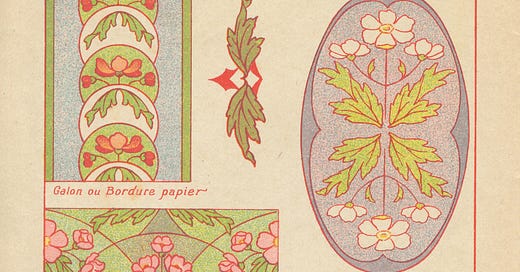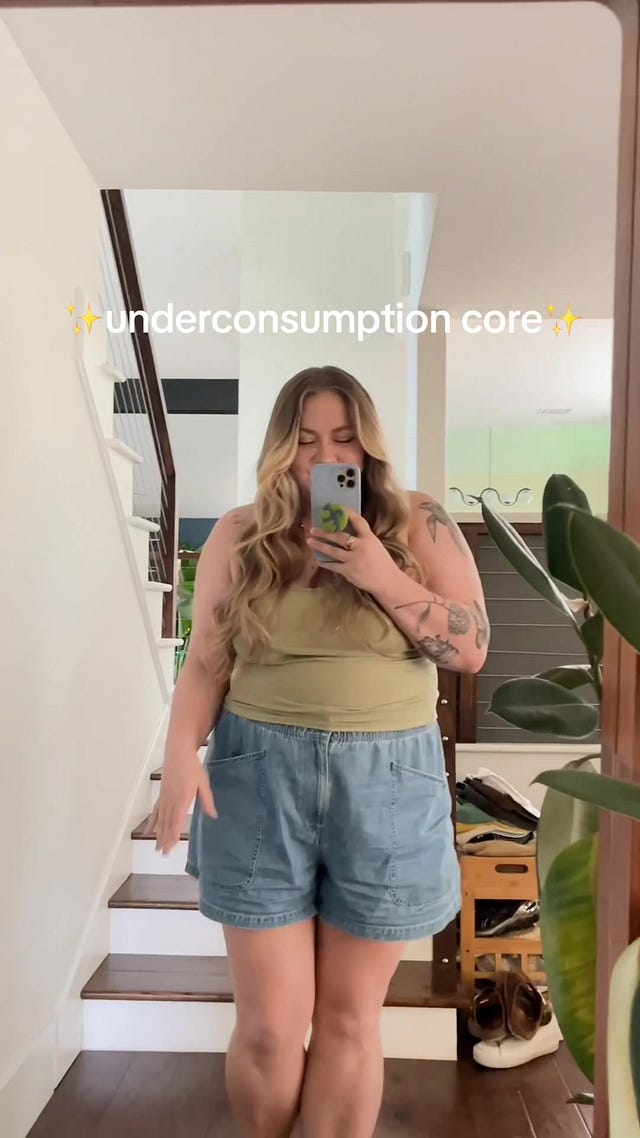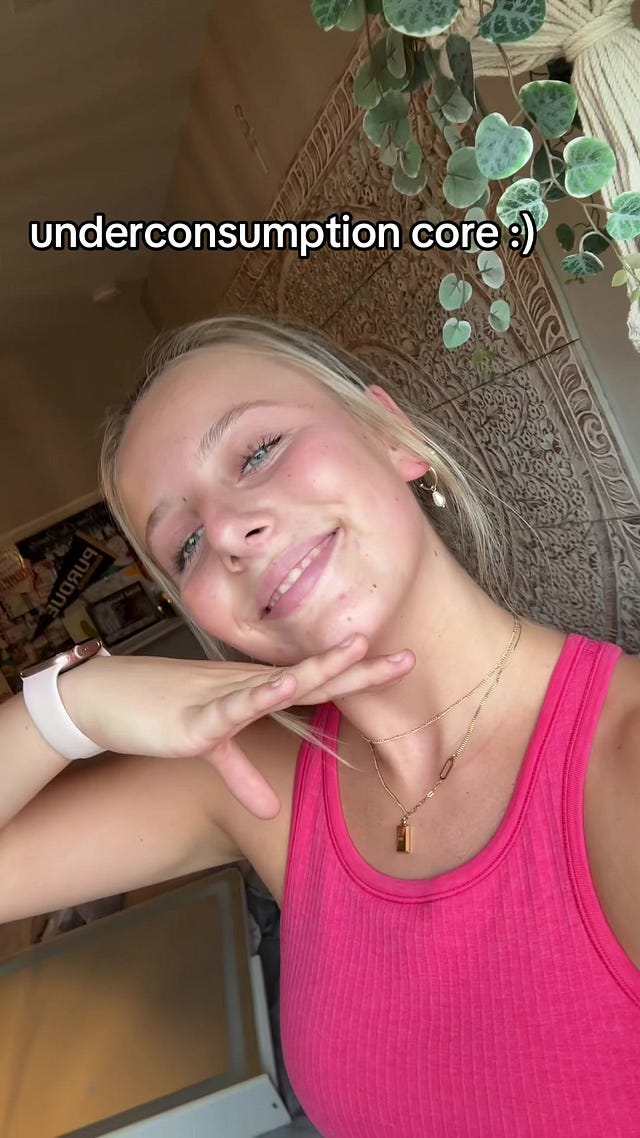what's on your underconsumption checklist?
has the world finally acknowledged that engaging in "amazon must haves" videos is destroying our wallet and the planet?

Underconsumption core, in a nutshell, is a trend conceptualized by people showing items they’ve owned for many years or items they’ve repurposed and given a new life to, straying away from the over-consumption movement that has deceptively crept its way into what “normal” should look like. Underconsumption is the antidote to overconsumption. Let’s all make sure to keep it that way, instead of treating this as a transient moment in social media history.
 Tiktok failed to load.
Tiktok failed to load.Enable 3rd party cookies or use another browser
I’ve decided to compile a list of things that seem to embody underconsumption core. Do note that this is not a comprehensive list. There are nuances to this lifestyle, and what works for someone else might not work for you. And vice versa. With that being said, this is what I’ve noted from watching a bunch of TikToks and reels. Some I can relate to, and others I absolutely cannot. You don’t need to check off every single item to say that you have embraced this lifestyle. Do what works for you, and adjust accordingly.
a not-so-comprehensive list,
Cut up products that come in a tube to get every last bit out
Thrift, thrift, thrift!!! Avoid buying new if possible
Not buying “pretty” containers to decant other products into, just for the aesthetic
Reuse old toothbrush to clean sinks/bathtubs
Save rubber bands from produce to tie food bags up
Project pan makeup and skincare before buying something new
Learn how to sew to make your own items or repair existing ones
Hang dry clothes
Own one fragrance at a time
Own only one water bottle
Grow your own food
Make your matcha and coffee at home
Propagate your own plants to greenify your home instead of buying new (or find cuttings/healthy plants on Facebook Marketplace)
Reuse plastic tupperware
Save condiment packets instead of throwing them away
Have a container of plastic utensils that come with your to-go food
Save all plastic or paper bags you get from the market to reuse
Stay away from trends
Don’t upgrade if the object you already own still has use left in it
Don’t restock your guest bedroom/bathroom with tons of items that you don’t use yourself (since people usually bring their own toiletries nowadays)
Never get nails/hair/lashes done
Have a minimal skincare and makeup routine (bc products expire and less is always more)
Own 1 reusable bottle that you’ve had for 5+ years
Care for heirlooms that get passed down to you
Have an interest in sustainability and environmentalism
Borrow books from the library/Libby or buy secondhand instead of buying new
Use public transportation or bike/walk whenever possible
Wear the same shoes for multiple occasions
Use reusable paper towel clothes instead of single use paper towels
Decorate home with plants
Get hair done minimally (bonus if you’ve always had virgin hair and get haircuts)
Grow your own food - green onions are the easiest!
Make vegetable broth from food scraps
Use reusable mop pads instead of disposable Swipper pads
No shopping on Amazon
Save and use cling wrap/foil multiple times until it breaks
Compost
Use old towels as rags
Use chapstick (Aquaphor, Blistex, Carmex) instead of lip gloss/oil
When going out, bring a lunchbox/tupperware container with a “just in case meal” if you get hungry
Embroider over stains
Stuff old fabric scraps into pillows
Borrow items from friends, family, or strangers (use Facebook or No Buy Groups) before buying
Spend time in nature because there’s nothing to buy there (excludes situations where camping/hiking gear is needed)
Use your items until they break
Regift your unwanted gifts
Unsubscribe to promotional emails and unfollow brands on Instagram
Save any shipping material (boxes, packages, envelopes) you receive to reuse
Use strained tea leaves for infused tea, facial scrubs, etc.
Use old clothes to dust furniture with instead of buying new cloths
Shop your parent’s closet
Dilute dish soap and use it to clean your surfaces
^ Dilute dish soap to “make more”
Ask how you can “McGyver” an item before discarding it
Wait before buying
Don’t throw away items in your home just because you want to fit a different aesthetic
things to note,
Decluttering is important, but make sure you do it consciously! Don’t throw everything away as an effort to do out of sight out of mind. Look through these items and figure out what you can sell, what you can mend/repurpose, what you can gift, what you can give to other people on a No Buy group. Goodwill/Salvation Army and the trash can should not be an option, unless there’s an extenuating circumstance that prevents you from doing anything else.
If you have money and are trying to embrace underconsumption, do it. It’s a more respectable and all around sustainable way to live than someone who has money and overconsumes.
Underconsumption is relative. To strive for a version of you that consumes less than a previous version of you is progress. Maybe it isn’t like underconsumption that’s shown in social media or items listed above, but taking the steps to pause before buying something, challenging your idea of consumerism, and assess all the non-essentials you’ve purchased this year can be considered underconsumption, or even the path to achieving this! In my personal opinion (and feel free to disagree), the world would do a lot better with everyone embracing the underconsumption core.
Underconsumption is the act of buying less and owning the items you already own for as long as possible. Therefore, if a more expensive item will last you longer than a cheaper one, then save up to buy the more expensive one. Cost doesn’t get factored into underconsumption, but rather, the measure of volume and traction of how often things exit and enter your life.
I’m interested in seeing how long underconsumption core is going to stay trending on social media. Trends like these are bound by a certain time limit, and I am dreading the thought of people bringing overconsumption habits back in style once this is over. Of course, I and other likeminded creators will continue this legacy of consuming less, and hope you embrace this as a lifestyle change over a fleeting trend.
Until next time,
—Beans









